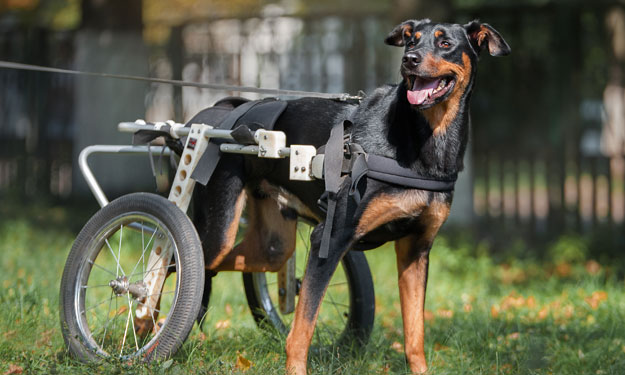Born to ride: Disabled pets still have a great quality of life!

While it may seem that pets that can’t walk on their own would be suffering or have a poor quality of life, the opposite is true if they are fitted with a canine mobility cart. Once they get used to the cart, most dogs get around very well and have a great quality of life.
Canine mobility carts can be used by any pet (even cats and farm animals!) that has significant weakness requiring assistance to ambulate. This is most often due to a neurological condition, but, in some cases, dogs with severe osteoarthritis (e.g., hip arthritis) may benefit from a cart to help alleviate pain and improve quality of life. Some companies even make carts for patients that have only front leg weakness or “quad carts” for patients with weakness in all 4 legs.
Some of our Patients’ Stories
Angus was brought in to the Neurology Department after a sudden onset of hind limb paralysis. MRI showed that he had a severe disk herniation (“slipped disk”). He only had a 50/50 chance of walking again because he lacked pain recognition when his toes were pinched (paralyzed dogs that DO retain pain recognition have a 95% chance of walking again). The owners pursued surgery to give him the best shot at walking again. Unfortunately, Angus is one of the 50% that didn’t regain the ability to walk. However, he has been enjoying life ever since in his canine “wheelchair.” Angus runs & plays in his cart and we have a hard time keeping up with him.
Bailey was a fantastic dog owned by one of our client care representatives. He was a sweet and gentle German Shorthaired Pointer that was diagnosed with Degenerative Myelopathy, a disease that causes a non-painful, chronic, slowly progressive hind limb weakness that eventually progresses to paralysis and front leg weakness. His owner put him in a cart 9 months after he was diagnosed. He did very well in his cart until 2 years after his diagnosis, well beyond how many dogs with his condition do, until the disease finally started to affect his front legs and he was humanely euthanized. While 2 years doesn’t sound like a long time for us, it is an extremely long time for a large breed dog. He had a great quality of life during that time and his owner treasured every minute that she had with him.
Canine carts can also be used during rehabilitation to help patients relearn to walk.
Mel is a Doberman pinscher that was brought in to MVRH following a sudden onset of inability to walk on all 4 legs. MRI revealed a herniated disk in his neck and he was taken to surgery to remove the ruptured disk material and decompress the spinal cord. He then started intensive physical therapy in our PT department and at home. Mel’s humans are extremely dedicated owners. When he didn’t regain the ability to walk quickly, they purchased a “quad cart” to help with his mobility, but also as an aid to physical therapy. As you can see from the video, he loved being in his cart. Eventually, he relearned to walk and eventually no longer needed his cart!
There are many companies that produce canine mobility carts. Here at Mass Vet, we recommend Eddie’s Wheels for Pets. They are a local company located in western Massachusetts. Their carts are custom made to the size of the pet, durable, and have large wheels that are less likely to get stuck while walking outdoors. The owners are incredibly nice and their customer service is excellent.